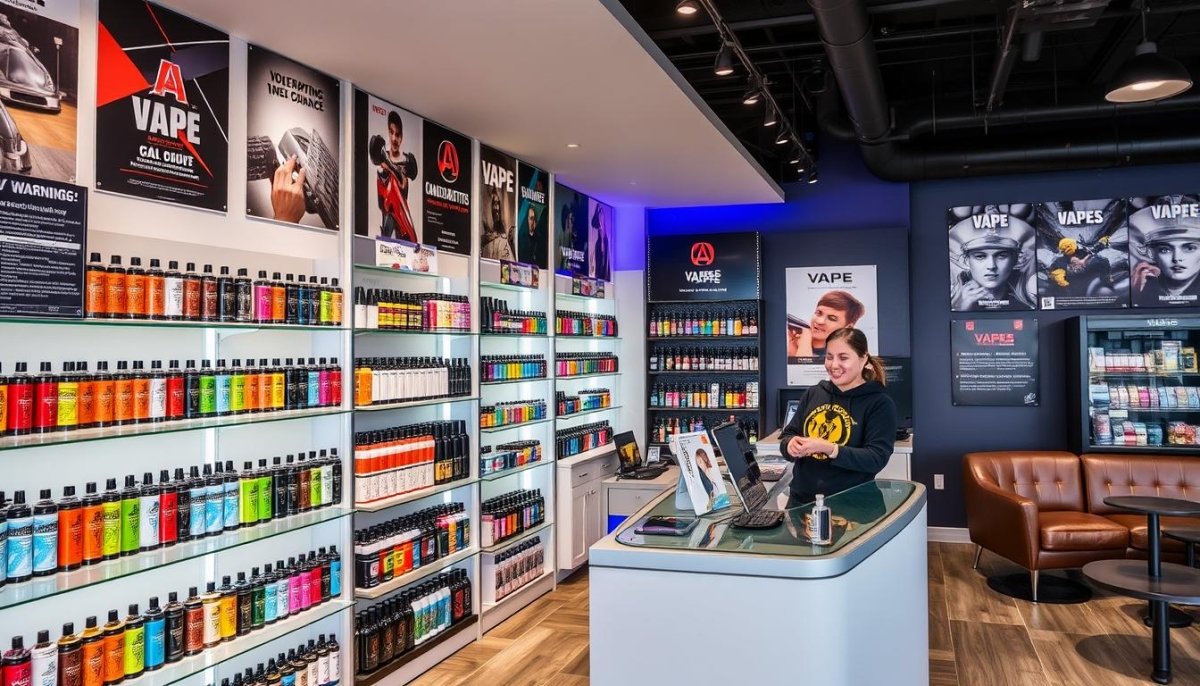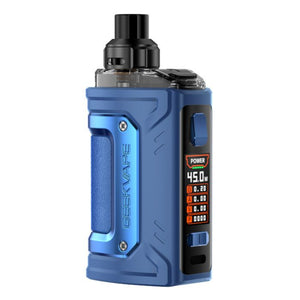Do You Need a Licence to Sell Vapes | Retail Guide

Do You Need a Licence to Sell Vapes in the UK?
In the United Kingdom, there's no special licence needed to sell vapes. Anyone can sell vaping products, like in specialist stores or even from a taxi. But, sellers must follow strict rules to sell legally and responsibly.
The UK government is thinking about introducing a licence system. This could make the vaping industry more accountable. It would also help local Trading Standards teams enforce the rules better.
Key Takeaways
- No specific licensing system exists for the vaping industry in the UK.
- Retailers must comply with regulations to ensure legal and responsible vape sales.
- The UK government is considering introducing a licensing scheme to improve accountability and enforcement.
- Proposed licensing framework could generate over £50 million in annual funding for the sector.
- Penalties for non-compliance under the scheme could reach up to £10,000 for retailers.
Understanding the Vaping Market in the UK
The UK's vaping industry has grown a lot in the last ten years. In 2012, there were 700,000 e-cigarette users. By 2021, this number had jumped to 3.6 million. This rise is mainly because more people use vaping to stop smoking.
A study found that over 50% of vapers in the UK used to smoke. Nine out of ten of them vape every day.
Overview of the Vaping Industry
Vaping retail sales in the UK have also gone up a lot. Between 2014 and 2022, sales rose by 9.4 million units in just four weeks. Disposable vapes are popular because they are easy to use and come in many flavours.
But, the industry faces challenges. There are worries about young people vaping and the presence of illegal products.
Current Trends in Vaping
The main people who vape in the UK are adult smokers trying to quit or cut down. This has made the government look closely at vaping. They want to make sure vaping doesn't attract too many young people.
Retailers selling vape products in the UK must follow strict rules. These rules include limits on nicotine levels and tank sizes.
Target Audience for Vapes
Even though vaping is growing, retailers need to know the laws to succeed in the UK. Selling products that don't meet the rules can lead to fines and losing stock. It's also important for staff to know how to check ages and understand the rules about advertising.
| Metric | Value |
|---|---|
| Number of vapers in the UK (2021) | 3.6 million |
| Percentage of current vapers who are ex-smokers | 53.8% |
| Increase in vaping retail sales (4-week period, 2014-2022) | 9.4 million units |
| Maximum nicotine strength for e-liquids in the UK | 20mg/ml |
| Maximum capacity limit for vape tanks in the UK | 2ml |
"The vaping industry in the UK has seen remarkable growth, with the number of e-cigarette users tripling over the past decade. As the market continues to evolve, retailers must stay vigilant in ensuring compliance with the ever-changing regulations to protect both their business and the public's health."
Legal Framework for Vaping Products
The UK's vaping laws are mainly set by the Tobacco and Related Products Regulations (TRPR). This law follows the European Union's Tobacco Products Directive (TPD). It outlines the rules for making, showing, and selling vaping devices and e-liquids.
Overview of Relevant Legislation
The TRPR covers many vaping product rules. For example, vape products can't have more than 20mg/ml of nicotine. Also, they can't hold more than 2ml of e-liquid. Breaking these rules can lead to fines of up to £5,000.
The Tobacco and Related Products Regulations (TRPR)
The TRPR also says all vaping products must get approval from the Medicines and Healthcare products Regulatory Agency (MHRA) before sale. This makes sure only safe products are sold.
The Role of the MHRA
The MHRA is key in watching over the vaping industry in the UK. They keep a list of approved products and check if new ones meet safety and quality standards. Shops should check the MHRA's website to make sure they're selling legal vaping products.
Vape businesses need to know the laws and the MHRA's role to stay legal. They must sell safe, legal products. Keeping up with new rules and joining industry groups helps vape shops in the UK.
Licensing Requirements
The vaping industry in the UK has strict rules. You don't need a special licence to sell vapes yet. But, you must follow strict laws. Local areas might have their own rules too.
Do You Need a Licence?
Right now, you don't need a licence to sell vapes. But, the UK government might change this soon. They want to make sure vapes are sold safely and responsibly.
They plan to make a system that could bring in £50 million a year. This money will help enforce the rules. The aim is to stop young people from vaping and ensure all products are legal.
Types of Licences for Selling Vapes
The exact licence system is still being worked on. It might be similar to those for alcohol and tobacco. There could be different licences based on how big your business is and how well you follow the rules.
You might need to get and keep these licences to sell vapes legally in the UK.
Local Authority Regulations
Local councils in the UK can also make their own rules for vape shops. These rules might limit how many shops there are or where they can be. They might also check if shops are following the rules.
Vape sellers need to keep up with these local rules. This way, they can make sure they are following the law.
Registering Your Business
Registering your vape business is key to legal operation in the UK. With changing vape shop rules and the need for the right licenses, it's vital to be compliant from the start.
Importance of Business Registration
Registering your business shows you're serious about selling vapes responsibly. It gives you the papers needed to prove you follow the rules. This includes age checks, product safety, and business insurance.
Necessary Documentation for Registration
- Proof of age verification systems in place to prevent underage sales
- Certificates of compliance for all vaping products sold
- Evidence of appropriate business insurance coverage
- Detailed inventory records and product traceability
Choosing a Business Structure
The legal form of your vape business affects taxes, liability, and how you run things. You might choose to be a sole trader, limited company, or partnership. Talk to an accountant or lawyer to find the best fit for your business.
Registering your vape business is a big step in following vape shop regulations and getting the right vape business licenses. By meeting the right paperwork and picking the right structure, you set up your vape business for success and compliance.
Health and Safety Standards
In the UK, vaping products must follow strict health and safety rules. These rules are set by the Medicines and Healthcare products Regulatory Agency (MHRA) and the Office for Product Safety and Standards (OPSS). They make sure vaping products are safe and of good quality.
Compliance with Health and Safety Regulations
Vaping products, like e-liquids and devices, must follow the Tobacco and Related Products Regulations (TRPR). There are limits on nicotine strength (no more than 20mg/ml) and e-liquid capacity (2ml max for disposables). Retailers must check that all vaping industry compliance products they sell meet these rules.
Product Safety Requirements
Illegal vaping products, such as high-nicotine or high-capacity devices like the 'Geek Bar Pro', cannot be sold in the UK. Retailers must carefully check the safety and legality of all legal vape sales before selling them to customers.
Responsibilities for Retailers
Retailers have a big role in keeping the vaping industry safe. They must make sure all products they sell follow the rules. This protects their customers and their business from legal problems.
"Ensuring the safety and quality of vaping products is paramount in maintaining consumer trust and safeguarding public health."
Marketing and Advertising Regulations
In the United Kingdom, vaping product ads face strict rules. The Committee of Advertising Practice (CAP) and Broadcast Committee of Advertising Practice (BCAP) set these guidelines. Retailers must follow these rules to promote vape retail permits and vaping laws responsibly.
Restrictions on Advertising Vaping Products
Vaping ads can't make false health claims or target non-smokers, especially kids. TV and radio ads are banned, but digital ads are allowed with certain rules. This helps keep ads safe and stops them from attracting young people.
- Ads can't make vaping look cool or appealing to the young.
- Using famous people or characters that kids might like is not allowed.
- Ads can't be shown in places where more than 25% of viewers are under 18.
Misleading Claims and Consumer Protection
Retailers need to be careful with health claims about vaping products. All ads must be truthful and follow consumer protection laws. False or exaggerated claims can lead to big fines and harm a business's reputation.
"The Tobacco and Related Products Regulations 2016 ('the Regulations') became law in the UK on 20 May 2016, setting the stage for stricter oversight of the vaping industry."
As rules change, retailers must keep up with the latest vaping laws and guidelines. This ensures their ads stay within the law and are responsible.
Age Restrictions for Sale
Vaping products have strict age rules in the UK, just like tobacco. It's illegal to sell them to anyone under 18, online or in stores. Shops must check ages well to follow the law and stop young people from buying them.
Legal Age to Purchase Vapes
In England, Wales, and Northern Ireland, you must be 18 to buy vapes. Scotland also has a 18-year-old rule. There, staff under 18 need a special permission to sell, and shops must have age check policies.
Age Verification Methods
- Retailers need a good way to check ages, like the Challenge 25 policy. This means customers who look under 25 must show ID.
- Good IDs include passports, photo driving licences, and PASS cards. Also, approved age cards, military IDs, and some foreign IDs are okay.
- In Scotland, digital age checks are not allowed for vape sales. Also, selling vapes from vending machines is banned there.
Consequences of Selling to Minors
Stores caught selling vapes to kids face big penalties. They could get fines up to £10,000 and lose their licence. In England and Wales, shops might get a quick £100 fine for selling to minors.
The UK government and vaping groups like the UKVIA are very serious about keeping vapes out of kids' hands. Shops must do their part by having strong age checks to stop young people from buying vapes.
Labelling and Packaging Requirements
The vaping industry in the United Kingdom has strict rules for labelling and packaging. These rules are in the Tobacco and Related Products Regulations (TRPR). They aim to give clear info to consumers about what's in vape products and their health risks.
Essential Information on Labels
Vape product labels need to have certain key info:
- A list of all ingredients, including their quantities and the nicotine content
- The batch number or lot identification
- The name and address of the manufacturer or importer
- The recommended conditions of use and any warnings or precautions
Warning Labels and Health Risks
Vape products also need warning labels. These labels must show the addictive nature of nicotine and the product's use. The warnings must cover a certain percentage of the packaging. They must be in a standard format to avoid misleading claims.
Packaging Regulations
The TRPR also has strict rules for vape packaging. All packaging must be safe for children and show if it's been tampered with. The packaging's design and info are also controlled. This is to stop any features that might attract kids or make false claims about the product.
By following these rules, vape shops in the UK can meet the vaping industry compliance and vape shop regulations. This protects consumers and helps the vaping market grow responsibly.
Importing and Exporting Vaping Products
The vaping industry is growing fast. UK retailers need to understand the rules for moving vaping products across borders. They must follow customs and product standards to trade vaping goods.
Import Duties and Regulations
Bringing vaping products into the UK has its own set of rules. Retailers must check that all items, like e-liquids and devices, meet the MHRA and TRPR standards. This includes nicotine levels, tank sizes, and more.
Export Rules for UK Retailers
When sending vaping products out of the UK, retailers must know the rules of the country they're sending to. The UK's vaping laws are similar to EU ones, making it easier to sell to Europe. But, businesses need to watch for any changes in these rules.
Compliance with EU Regulations
Even though the UK left the EU, its vaping laws are still close to EU ones. This makes it easier for UK retailers to sell to the EU. But, they must keep up with any new rules to stay legal.
Dealing with import duties, export rules, and regulations can be tough for vape businesses. By keeping up with the latest laws and working with industry groups, UK retailers can grow their business globally. They can do this while making sure they follow the law.
"The vaping industry is a rapidly evolving landscape, and staying on top of the latest import and export regulations is crucial for UK retailers looking to expand their reach. Compliance is key to ensuring the long-term success and sustainability of your vape business."
Importance of Staff Training
In the fast-changing vaping world, training staff is key for vape seller registration and vaping industry compliance. They need to know about products, selling responsibly, and giving great customer service. This keeps the business thriving and follows the rules.
Training Staff on Product Knowledge
It's vital to train staff well on vaping products. They should know the differences between e-liquids and devices and the newest market trends. This knowledge helps customers make informed choices and boosts the business's reputation for responsible selling.
Responsible Selling Practices
- Following age checks to stop sales to minors, as shown by ASH Smokefree's UK youth vaping study.
- Knowing how to spot and refuse illegal vaping product sales, as the UKVIA suggests to raise fines.
- Teaching staff to spot and refuse sales to drunk or high customers, keeping the shop safe.
Customer Service in the Vaping Industry
Good customer service is crucial for vaping shops. Staff should teach customers about vaping, health risks, and safe use. This builds trust and helps promote vaping responsibly.
Spending on staff training boosts vape seller registration and vaping industry compliance. It also improves customer service, helping the business grow and stay successful.
Consumer Rights and Returns
In the UK, buying vape sales comes with strong consumer rights. These rights include getting refunds for faulty items and having complaints handled well. Retailers must follow strict rules to keep their customers' trust.
Understanding Consumer Rights under UK Law
The Consumer Rights Act 2015 sets out key rights for vape retail permits and other goods. It makes sure customers get products that are good quality, work as they should, and match what they were told. If a vape product is faulty, customers can ask for a refund, repair, or a new one.
Managing Returns and Refunds
- Retailers need clear return and refund policies, especially for vaping products.
- Customers should find it easy to get information on returns, including any rules or deadlines.
- Dealing with returns and refunds quickly and nicely helps keep customers happy and loyal.
Handling Complaints Effectively
Good complaint handling is key to keeping customer trust and following the law. Retailers should have strong ways to handle and solve customer complaints. This ensures problems are fixed quickly and to the customer's satisfaction.
| Statistic | Value |
|---|---|
| Percentage of UK adult population using e-cigarettes in 2023 | 12% |
| Increase in children aged 11-17 using vaping products in the past three years | Tripled |
| Percentage of children in Great Britain aged 11-17 who have tried vaping (March-April 2023) | 20.5% |
| Percentage of 11 to 16-year-olds in Northern Ireland who have ever used an e-cigarette | 21.3% |
By respecting consumer rights, retailers show they care about vape sales. This builds trust with customers and helps the UK vaping market grow in the long run.
Environmental Considerations
The vaping industry is growing fast, but it's causing environmental worries. Disposable vapes are especially under the spotlight for their impact on waste. Vape shops need to follow e-waste rules to protect our planet.
E-Waste and Disposal Regulations
In the UK, laws like the Waste Electrical and Electronic Equipment (WEEE) Directive are in place. They make sure vape shops dispose of devices safely. Shops should tell customers how to recycle their used vapes and batteries properly.
Sustainable Practices for Vaping Retailers
- Offering in-store recycling programmes for used vaping devices and batteries.
- Encouraging customers to return their old devices for proper disposal or recycling.
- Exploring sustainable packaging solutions, such as recyclable or biodegradable materials, to reduce waste.
- Educating staff and customers on the importance of environmental stewardship in the vaping industry.
The Impact of Vaping on the Environment
Vaping affects the environment in many ways, not just through disposal. It can lead to pollution and harm wildlife. Vape shop owners should keep up with environmental research and rules to follow vaping industry compliance and vape shop regulations.
| Environmental Impact | Estimated Emissions | Potential Consequences |
|---|---|---|
| Greenhouse gas emissions from single-use vapes | Over 3,000 tonnes CO2e annually in Scotland, projected to rise to over 8,000 tonnes CO2e in the next 3 years | Contribution to climate change and global warming |
| Air pollution from waste fires and incineration | Over 14,600 tonnes CO2e in the UK in 2023, projected to increase to over 176,000 tonnes CO2e by 2030 | Negative impacts on air quality and public health |
| Littering and harm to wildlife | Incidents of animal deaths reported after ingesting vapes | Contamination of habitats and risk to biodiversity |
Vape shops must keep up with environmental rules as the industry grows. By adopting green practices and promoting recycling, they can help make the industry more sustainable.
Keeping Up to Date with Regulations
In the fast-changing vaping world, it's crucial for retailers to keep up with new rules. Vape shop owners need to watch for updates to follow the law. This keeps their business on the right track.
Resources for Staying Informed
The Medicines and Healthcare products Regulatory Agency (MHRA) website is a great place for vape shop owners to learn. It has the latest on the Tobacco and Related Products Regulations (TRPR) that rule the vaping market. Local trading standards offices can also help with what's needed in your area.
Joining groups like the UK Vaping Industry Association (UKVIA) is also smart. They offer insights, training, and help to deal with tricky rules.
Importance of Regular Compliance Checks
Checking if you're following the rules regularly is key. Vape shops should look at their practices, products, and ads to make sure they meet the TRPR and other laws.
Being proactive with rules helps avoid fines and shows you care about selling responsibly. This builds trust with customers and helps the vaping industry as a whole.
Engaging with Industry Associations
Being part of groups like the UKVIA helps vape shops stay updated on rules. They get training and help shape the vaping world. This keeps them ahead and promotes good practices.
Working together with other shops and regulators makes the vaping market better. It helps everyone involved.
| Key Vaping Regulations in the UK | Description |
|---|---|
| Tobacco and Related Products Regulations 2016 (TRPR) | These rules make sure vaping products and nicotine are safe and of good quality. They cover things like labels, packaging, and how much nicotine is in them. |
| Advertising Restrictions | Vaping ads have rules. They can't be everywhere, like in newspapers, magazines, and on TV. |
| Proposed Vape Retailer Licensing Scheme | This plan wants to make sure there's money for checking shops and stopping bad things. It's about keeping young people safe and stopping illegal sales. |
By keeping up with news, doing regular checks, and joining groups, vape shops can handle the changing vaping laws and vape licensing requirements in the UK. This keeps their business legal and helps the vaping market grow responsibly.
Conclusion: Navigating the Vaping Market Legally
In the UK, you don't need a special licence to sell vapes. But, you must follow strict rules to sell legally and safely. You need to check ages, keep products up to standard, label them right, and market responsibly.
Final Thoughts on Licencing
The UK's vaping market is watched closely by the Medicines and Healthcare products Regulatory Agency (MHRA). Even without a licence, rules might get stricter. So, vape shops must stay alert and ready for changes.
Summary of Key Requirements
Vape shops in the UK must follow many laws. The Tobacco and Related Products Regulations (TRPR) cover what products can be sold, how they're labelled, and how they're marketed. It's also important to check ages and keep products safe to avoid fines.
Keeping products of high quality, following health and safety rules, and training staff well are also key. These steps help ensure your vape shop meets all the legal requirements.
Future Trends and Regulatory Changes
The vaping market is always changing, and so are the rules. Expect stricter rules on flavours, packaging, and disposable vapes. For example, Scotland might ban single-use vapes soon, focusing on the environment.
To keep up, stay updated on new laws and join industry groups. This way, you can handle the UK vaping market's future changes well.
FAQ
Do you need a licence to sell vapes in the UK?
No, there's no specific licence needed to sell vapes in the UK. Anyone can sell them, from specialist stores to taxi drivers. But, sellers must follow strict rules to sell legally and responsibly.
What is the current state of the vaping market in the UK?
The UK vaping market is growing fast, with nearly 4.5 million adult users. Disposable vapes are popular for their ease and variety of flavours. The market faces issues like youth vaping and illegal sales. It mainly targets adult smokers wanting to quit or cut down.
What is the legal framework for vaping products in the UK?
The UK's vaping laws are shaped by the Tobacco Products Directive (TPD). The MHRA and OPSS oversee product safety and quality. The TRPR sets rules on nicotine levels, tank sizes, and packaging.
Do vape retailers need a specific licence to operate in the UK?
No specific licence is needed to sell vapes in the UK. But, sellers must follow strict rules. Local areas might have extra rules. A new licence system could bring in up to £50 million a year for enforcement.
What are the requirements for registering a vape business in the UK?
To legally run a vape business, you need to register. You'll need proof of age checks, product safety certificates, and business insurance. Choosing the right business structure is also key for taxes and legal protection.
What health and safety standards must vape products meet in the UK?
Vaping products must meet strict safety rules from the MHRA and OPSS. They can't have more than 20mg/ml nicotine or more than 2ml e-liquid. Sellers must ensure all products meet these standards.
How are vaping products advertised and marketed in the UK?
Advertising vaping products in the UK is tightly controlled. The CAP and BCAP codes set the rules. Ads can't make false health claims or target non-smokers, especially kids.
What are the age restrictions for purchasing vaping products in the UK?
It's illegal to sell vaping products to under-18s in the UK. Sellers must have strong age checks. Breaking these rules can lead to fines, losing your licence, and even prosecution.
What are the labelling and packaging requirements for vaping products in the UK?
UK rules require clear labels and packaging for vape products. Labels must list ingredients, nicotine levels, and health risks. Packaging must be safe for kids and show if it's been tampered with.
What are the requirements for importing and exporting vaping products in the UK?
Importing vaping products requires following UK customs and product standards. Sellers must ensure products meet MHRA and TRPR rules. Exporting vape products means following UK and destination country laws.






